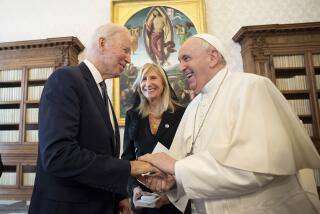The German Pope
The Roman Catholic Church did the most unexpected thing Tuesday by doing the expected. The last two papal conclaves seemed to shrink from anyone seen as a front-runner.
The quick election of Cardinal Joseph Ratzinger speaks quiet volumes about what cardinals seek from the new pope: a stable interregnum after 26 years under the charismatic Pope John Paul II. Benedict XVI will hold to the late popeâs theologically conservative line, but he wonât do it all that long, giving the church a breather in which to plan its future. At 78, he is among the oldest men to assume the papacy. Just before his selection, Ratzinger, the dean of cardinals who orchestrated John Paul IIâs funeral, railed against the âdictatorship of relativism.â
The church is sadly putting off a change in worldview and retaining its Eurocentric focus. By failing to pick a pope from Latin America or elsewhere in the developing world, the church reinforces the impression that it is a colonial enterprise, run in Europe by Europeans who see themselves as uniquely qualified to serve as Godâs interlocutor. Moreover, Benedict XVI has staunchly opposed allowing Turkey to join the European Union, on the grounds that Europe should be preserved as a Christian entity.
On pressing social issues, this aggressive German cardinal is certain to continue and even strengthen the churchâs directives against birth control, a stance that contributes to the suffering of AIDS-ravaged Africa. He probably will tolerate no talk of loosening church views on women priests, divorce and stem cell research -- other positions that have lost the church followers even under an adored pope.
We can only hope that Benedict XVIâs attacks on âmoral relativismâ will lead him to take a stronger stance than John Paul II did on the molestations by priests that have cost the church support in the United States. Surely this is not the only nation where young people have been victimized; will the pope act to root this out as actively as he has condemned gays? Not necessarily. Itâs believed that the cardinals sought a swift election to downplay perceptions that the church is divided. Hence the rush to anoint the front-runner, John Paul IIâs chief lieutenant.
Benedict XVI is known as an intellectual, a quick-witted man who is likely to take care of the administrative housekeeping that the late pope tended to overlook. He is used to working behind the scenes, serving as the popeâs doctrinal enforcer. As such, he has been a largely polarizing force in the church, coming down hard on Catholic leaders who sought social justice in Latin America or dissented from the Vatican in their teachings.
But how will that play in front of the cameras that Pope John Paul II employed so masterfully to beam his message and his gentle presence? Perhaps it wonât matter. Few if any successors could hope to match the late popeâs spiritual charisma.
Those are the issues in Benedict XVIâs past and future. But on Tuesday, the bells tolled and the white-haired man newly clad in papal white shyly smiled.


